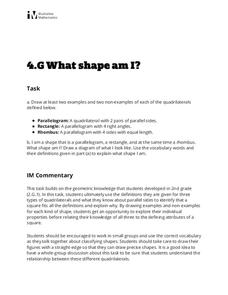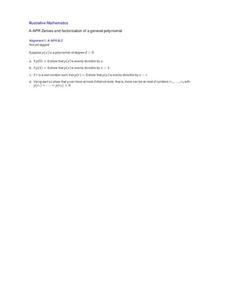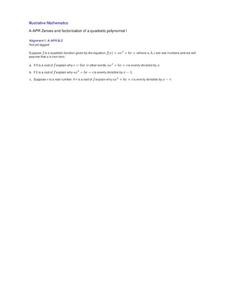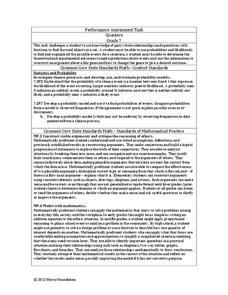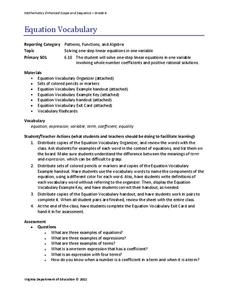Illustrative Mathematics
What Shape Am I?
Sharpen your pencil and grab a ruler, it's time to draw some quadrilaterals! Given the definition of a parallelogram, rectangle, and rhombus, learners draw examples and nonexamples of each figure. The three definitions are...
Curated OER
Slang Words Beginning with P
In this recognizing slang words online/interactive worksheet, students read sentences with descriptions or definitions in context and choose the slang words that begin with the letter p. Students match 7 answers.
Illustrative Mathematics
Placing a Square Root on the Number Line
There are many ways to approach finding the rational approximation of an unknown square root. Here is a problem that will help math learners make a connection between square roots and their order on a number line. As usual, determine two...
Science Matters
Earthquakes and Volcanoes Pre-Assessment
See how much your class knows about earthquakes and volcanic activity and how these events shape geologic features. The first lesson in the series of 20 is a pre-test to find out what pupils already know. It includes 10 vocabulary...
Illustrative Mathematics
What is a Trapezoid? (Part 1)
Challenge your class to construct a definition for trapezoids. Looking at four examples and four non-examples, students individually create definitions and use them to classify an unknown shape. Allow for small group and whole-class...
Illustrative Mathematics
Estimating Square Roots
No calculators! Assure your learners that they can find the square root of a large number. All they need are two known squares close by and a table. Come up with an additional practice and your number crunchers will have it mastered in...
Curated OER
The Class Trip
Mrs. Moore's class is trying to earn money for a trip to the science museum, but how much more do they need? Solve this problem with your own class as they develop their ability to model real-life situations algebraically. As an added...
Balanced Assessment
A Sharper Image
Not all continuous functions are differentiable. Pupils find three types of functions that are defined everywhere but not differentiable for all values of x. Along with providing examples of each type of function, learners...
Barbara Kowal
Winter Vocabulary Quiz
Asses scholars' vocabulary skills with a winter-themed multiple choice quiz. Learners read a short definition and choose from one of four words it describes.
EngageNY
End of Unit 3 Assessment: Readers Theater Commentary
Prove it! In the end-of-unit assessment, scholars write a commentary and provide evidence to justify the connection between their reader's theater scripts and To Kill A Mockingbird. After completing the assessment, they practice...
Illustrative Mathematics
Exponentials and Logarithms I
This task focuses on using the verbal definition of the logarithm to understand that a logarithm is an exponent. Learners complete six computational exercises using the inverse properties of logs and exponents and answer two...
EngageNY
Equivalent Ratios
Equivalent ratios show up on tape. Young mathematicians use tape diagrams to create equivalent ratios in the initial lesson on the topic. They learn the definition of equivalent ratios and use it to build others in the third segment of a...
Bowland
German or English?
Sprechen sie Deutsch? Future cryptographers must decide whether an unknown text is written in English or in German. They use provided pie charts about the frequency of words in the English and German languages to help make their decisions.
Curated OER
Is This a Rectangle?
How do you show that something is a rectangle? This activity starts with four coordinate points and asks young geometers to explain whether they create a rectangle. Knowledge from both geometry and algebra come into play here, as well...
Illustrative Mathematics
Zeroes and Factorization of a General Polynomial
These four problems will guide your class through the idea behind the Fundamental Theorem of Algebra, which states that a polynomial of degree n has exactly n roots. Use the division algorithm and the definition of a zero/root of a...
Illustrative Mathematics
Zeroes and factorization of a quadratic polynomial I
This activity uses the division algorithm and the definition of a zero/root of a function to guide your class to see the relationship between zeros and factors of a general quadratic, which can later be generalized to the Remainder...
Noyce Foundation
Counters
For some, probability is a losing proposition. The assessment item requires an understanding of fraction operations, probability, and fair games. Pupils determine the fractional portions of an event. They continue to determine whether...
EngageNY
Mid-Unit Assessment: Justification for Character and Scene Selection
When it comes to love and midsummer nights, confessions are tricky. Learners place themselves in the shoes of a character from William Shakespeare's A Midsummer Night's Dream and explain how a character manipulated another character in...
Balanced Assessment
Dog Tags
Class members demonstrate a proficiency with conditional probabilities through this task. Individuals calculate probabilities using multiplication and addition. They also distinguish between repetition and non-repetition while...
EngageNY
Solving Problems by Finding Equivalent Ratios
Combine total quantities and equivalent ratios in problem solving. The fifth lesson in a series of 29 presents problems that can be solved using equivalent ratios. Pupils use part-to-part ratios and either sums or differences of the...
California Education Partners
Improving Our Schools
Split the work three ways. Learners use their knowledge of fractions to solve problems dealing with splitting up work loads evenly between three groups. Scholars determine the fractional portion of work each group will do along with...
Virginia Department of Education
Equation Vocabulary
You'd feel bad if someone called you by the wrong name — and equations are no different. Young mathematicians learn the vocabulary associated with equations and expressions identifying these components in sample equations.
EngageNY
Writing Equations Using Symbols
Build upon prior equation writing experience to create more complicated equations. Lesson one in a 33-part unit builds upon the class members' sixth and seventh grade experience of writing linear equations. Several examples...
EngageNY
The Relationship Between Visual Fraction Models and Equations
Ours is to wonder why, not just to invert and multiply. The seventh installment of a 21-part module uses fraction models to help pupils understand why the invert-and-multiply strategy for dividing fractions works. They then work on some...
